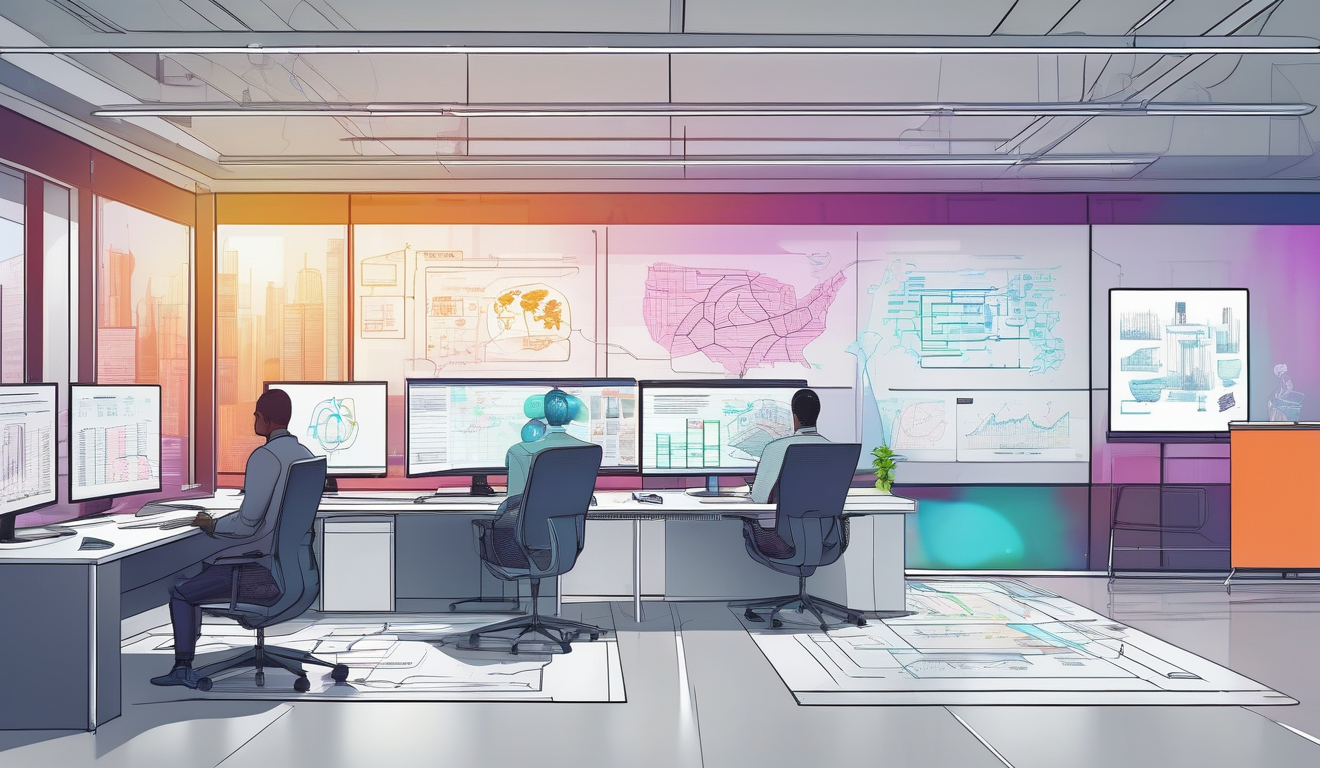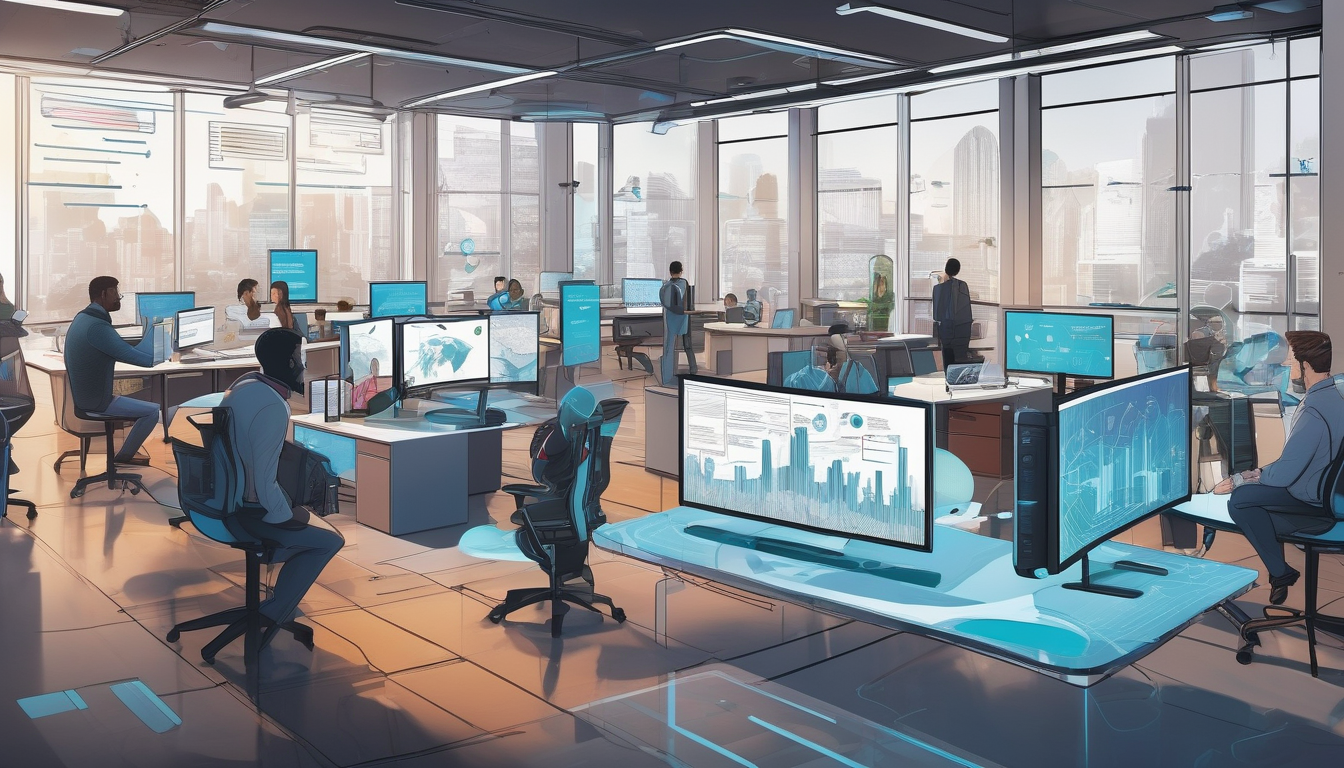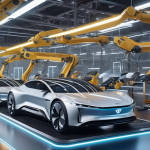How AI Is Transforming the Future of Work

The workplace is undergoing a monumental shift, thanks to the rise of artificial intelligence (AI). This technology is not just a buzzword anymore; it’s a game-changer that is reshaping how we work, interact, and even think about our jobs. Imagine a world where mundane tasks are handled by machines, allowing humans to focus on creativity and innovation. Sounds like a sci-fi movie, right? But this is our reality today, and it’s only going to get more exciting.
So, what’s driving this incredible transformation? Several factors are at play. First off, the need for efficiency in business operations is pushing companies to adopt AI technologies. From automating customer service inquiries to analyzing data trends, AI is stepping in to save time and resources. Additionally, the rise of remote work has accelerated the demand for AI tools that facilitate collaboration and productivity from anywhere in the world. Companies are realizing that integrating AI is no longer optional; it’s essential for survival in a competitive market.
Let’s talk about the perks! AI is not just a tool for companies; it’s also a boon for employees. With AI handling repetitive tasks, workers can redirect their energy towards more impactful projects. Imagine being able to spend more time brainstorming innovative ideas instead of sifting through endless spreadsheets! This shift not only boosts productivity but also enhances job satisfaction and work-life balance. Employees are feeling less stressed and more engaged, which is a win-win for everyone involved.
One of the most significant advantages of AI is its ability to automate mundane tasks. Think about it: how much time do you spend on repetitive activities that could easily be delegated to a machine? Tasks like data entry, scheduling, and basic customer queries can be automated, allowing employees to focus on strategic thinking. This not only enhances productivity but also fosters a more dynamic work environment.
However, with great power comes great responsibility. The automation of tasks is reshaping job roles across industries. While some jobs may become obsolete, new opportunities are emerging. The key is adaptability; workers must be prepared to take on new responsibilities that leverage their unique human skills.
Moreover, AI is revolutionizing decision-making processes. By analyzing vast datasets in seconds, AI provides insights that help employees make informed choices. This capability is invaluable in fast-paced environments where timely decisions can make or break a business.
Of course, the integration of AI isn’t without its challenges. Issues like job displacement and ethical concerns are at the forefront of discussions. It’s crucial for companies to address these challenges head-on, ensuring that their workforce is prepared for the future.
Looking ahead, the job market is evolving rapidly due to AI advancements. While some roles may decline, others are set to flourish. The future landscape of employment will require a blend of technical skills and human creativity.
As AI continues to evolve, new job roles will emerge that require specialized skills. Think about positions like AI trainers, data analysts, and even ethicists who ensure that AI is used responsibly. These roles will be crucial in navigating an AI-driven world.
Finally, as job requirements shift, reskilling and upskilling will become essential. Companies and employees alike must invest in continuous learning to adapt to the changing landscape. Strategies like online courses, workshops, and mentorship programs will be key in preparing the workforce for the future.

The Rise of AI in the Workplace
Artificial Intelligence (AI) is no longer a futuristic concept; it’s a reality that is rapidly reshaping the workplace. With advancements in technology, businesses across various sectors are increasingly adopting AI solutions to enhance their operations. But what’s driving this wave of AI integration? For starters, the need for efficiency and productivity is at an all-time high. Companies are looking for ways to streamline processes and reduce costs, and AI presents a compelling solution.
Moreover, the rise of big data has created an environment where AI can thrive. Organizations are now able to collect vast amounts of data, and AI algorithms can analyze this data in real-time, providing insights that were previously unimaginable. This capability not only aids in decision-making but also allows businesses to tailor their services to meet customer needs more effectively.
Another factor contributing to the rise of AI in the workplace is the competitive landscape. Companies that leverage AI technologies can outperform their competitors, leading to a significant shift in market dynamics. As more organizations recognize the advantages of AI, the pressure to adopt these technologies increases.
Here are some key factors driving AI integration:
- Cost Reduction: AI can automate routine tasks, reducing the need for human labor and minimizing operational costs.
- Increased Accuracy: AI systems can perform tasks with a level of precision that far exceeds human capabilities, leading to fewer errors.
- Enhanced Customer Experience: AI can analyze customer data to provide personalized experiences, improving customer satisfaction and loyalty.
As we witness this transformation, it’s essential to acknowledge that AI is not just a tool; it’s a game changer that is redefining the very fabric of work. The integration of AI technologies is creating a ripple effect, influencing not just how tasks are performed but also the skills that will be in demand in the future. As we move forward, understanding the implications of AI in the workplace will be crucial for both employers and employees alike.

Benefits of AI for Employees
Artificial Intelligence (AI) is not just a buzzword; it’s a game-changer in the workplace. Imagine a scenario where your daily tasks are streamlined, allowing you to focus on what truly matters—this is the reality AI is creating for employees across various sectors. From enhancing productivity to improving work-life balance, the advantages of AI are numerous and impactful.
One of the most significant benefits of AI is its ability to automate repetitive tasks. Think about those mundane activities that eat up your time—data entry, scheduling, or even sorting through emails. By automating these processes, AI not only saves time but also reduces the risk of human error. This means that employees can redirect their energy towards more strategic and creative endeavors, ultimately leading to greater job satisfaction. For instance, instead of spending hours on routine tasks, employees can now engage in brainstorming sessions or innovation projects that drive the company forward.
Moreover, AI tools are designed to enhance workflows and collaboration among teams. With AI-powered platforms, employees can easily share information, track project progress, and communicate effectively. This streamlined communication fosters a more cohesive work environment, where everyone is on the same page. As a result, teams can achieve their goals faster and more efficiently, which is a win-win for both employees and employers.
Another key advantage lies in AI’s ability to provide personalized insights that empower employees to make informed decisions. Imagine having a virtual assistant that analyzes data and presents you with actionable recommendations. This capability not only enhances decision-making but also boosts confidence among employees, as they have access to data-driven insights that were previously unavailable. As a result, employees can feel more in control of their work and contribute meaningfully to their organizations.
In summary, the integration of AI in the workplace offers a myriad of benefits for employees. From automating tedious tasks to enhancing collaboration and decision-making, AI is reshaping the work experience for the better. As we embrace this technological revolution, it’s essential to recognize that the future of work is not just about machines; it’s about empowering people to thrive in an AI-driven world.
Automation of Repetitive Tasks
In today’s fast-paced work environment, automation is becoming a game-changer for many businesses. Imagine a world where tedious, repetitive tasks are handled by machines, allowing employees to unleash their creativity and strategic thinking. This is not just a dream; it’s the reality that artificial intelligence is crafting for us. By automating mundane tasks, AI is like a breath of fresh air, clearing the fog of monotony that often clouds our workdays.
Think about it: how many hours do we spend on tasks that don’t really require our unique human touch? From data entry to scheduling meetings, these repetitive activities can drain our energy and time. With AI stepping in, employees can redirect their focus toward more meaningful projects. For instance, AI can effortlessly manage inventory levels or handle customer inquiries through chatbots, freeing up human workers to concentrate on strategy and innovation.
The implications of this shift are profound. Not only does it enhance productivity, but it also fosters a more engaging work environment. Employees can find greater job satisfaction when they’re not bogged down by repetitive tasks. Consider the following types of tasks that AI can automate:
- Data entry and management
- Email filtering and response
- Scheduling and calendar management
- Customer service inquiries
As we embrace this transformation, it’s essential to recognize that automation is not about replacing jobs; rather, it’s about redefining them. With AI taking over the repetitive tasks, employees can evolve into roles that require critical thinking and creativity. This shift paves the way for a more dynamic workforce, where people can leverage their unique skills and talents.
In conclusion, the automation of repetitive tasks through AI is not just a trend; it’s a fundamental shift in how we approach work. By embracing this change, businesses can enhance productivity, improve employee satisfaction, and ultimately drive innovation. The future of work is here, and it’s more exciting than ever!
Impact on Job Roles
The introduction of AI into the workplace is not just a technological upgrade; it’s a paradigm shift that is reshaping job roles in ways we never imagined. As AI takes over repetitive and mundane tasks, employees find themselves transitioning from traditional roles to more strategic positions. This shift can be likened to a butterfly emerging from its cocoon—the transformation is profound, and the potential is vast.
For instance, consider how customer service roles are evolving. With AI-driven chatbots handling basic inquiries, customer service representatives are now focusing on more complex issues that require human empathy and critical thinking. This not only enhances job satisfaction but also allows employees to develop new skills that are more aligned with the future of work. In fact, a recent study showed that over 60% of employees reported feeling more engaged in their roles when they could concentrate on higher-level tasks.
Moreover, the integration of AI is creating entirely new job roles that didn’t exist a decade ago. Positions such as AI trainers, data analysts, and AI ethicists are becoming essential as companies seek to harness the power of artificial intelligence responsibly. This evolution is not just about replacing jobs; it’s about creating opportunities for workers to thrive in an AI-driven landscape.
However, it’s essential to acknowledge that this transition isn’t without its challenges. Some roles may become obsolete, leading to concerns about job displacement. Yet, history has shown us that technological advancements often lead to the creation of new industries and job categories. For example, the rise of the internet led to jobs in web development, digital marketing, and cybersecurity that were previously unheard of.
In conclusion, the impact of AI on job roles is multifaceted. While it brings about changes that can be daunting, it also opens doors to exciting new possibilities. Embracing this change means being adaptable and ready to learn, ensuring that the workforce remains relevant and empowered in this evolving landscape.
Enhancing Decision-Making
In today’s fast-paced business environment, making informed decisions is more crucial than ever. With the integration of AI technologies, organizations are experiencing a revolutionary shift in how decisions are made. Imagine having a supercharged assistant that can sift through mountains of data in seconds, pinpointing trends and insights that would take humans weeks to uncover. This is the power of AI in enhancing decision-making processes.
AI tools can analyze vast datasets and provide actionable insights, allowing companies to respond to market changes almost in real-time. For instance, AI algorithms can evaluate customer behavior patterns, helping businesses tailor their strategies to meet consumer demands effectively. This data-driven approach not only boosts efficiency but also minimizes the risks associated with decision-making.
Moreover, AI-driven analytics can significantly reduce human biases in decision-making. Traditional methods often rely on gut feelings or past experiences, which can cloud judgment. However, with AI, decisions are based on hard data and objective analysis. This shift can lead to more accurate outcomes and better strategic planning.
To illustrate the impact of AI on decision-making, consider the following table that highlights key benefits:
| Benefit | Description |
|---|---|
| Speed | AI processes data at lightning speed, enabling quicker decision-making. |
| Accuracy | Data-driven insights reduce the chances of errors, leading to more precise decisions. |
| Predictive Analysis | AI can forecast future trends based on historical data, helping businesses stay ahead. |
In essence, the integration of AI in decision-making not only empowers employees but also transforms the organizational landscape. By leveraging AI, companies can navigate complexities with greater confidence and agility. As we move forward, embracing these intelligent systems will be pivotal in maintaining a competitive edge in the market. So, are you ready to harness the power of AI to elevate your decision-making processes?
Challenges of AI Integration
As much as we rave about the incredible potential of artificial intelligence, we cannot ignore the challenges that come hand in hand with its integration into the workplace. The reality is that while AI can revolutionize how we work, it also raises significant concerns that need to be addressed. One of the most pressing issues is job displacement. As AI systems become more capable, there’s a genuine fear that many jobs, particularly those involving repetitive tasks, may become obsolete. Workers in sectors like manufacturing and data entry are particularly vulnerable, as these roles can be easily automated.
Another challenge is the ethical concerns surrounding AI. Questions about bias in algorithms, data privacy, and decision-making transparency are becoming increasingly important. For instance, if an AI system makes hiring decisions based on biased data, it could perpetuate discrimination in the workplace. This raises the question: how can we ensure that AI is used responsibly and ethically in our organizations?
Moreover, the need for reskilling poses a significant hurdle. As AI changes the landscape of job requirements, many employees will need to learn new skills to keep up with the evolving demands of their roles. Companies must invest in training programs to help workers transition into new positions, which can be both time-consuming and costly. A recent survey indicated that 65% of employees believe they will need to reskill to stay relevant in their jobs due to AI advancements.
| Challenge | Description |
|---|---|
| Job Displacement | Automation of repetitive tasks leading to job loss in certain sectors. |
| Ethical Concerns | Issues related to bias in AI algorithms and data privacy. |
| Need for Reskilling | Employees require new skills to adapt to changing job demands. |
In summary, while AI offers a plethora of benefits, it also presents significant challenges that organizations must navigate. Addressing these issues requires a concerted effort from both employers and employees to ensure that the transition to an AI-driven workplace is smooth and equitable. After all, the goal should be to enhance human capabilities, not to replace them.

The Future Job Market
As we stand on the brink of a new era shaped by artificial intelligence, the future job market is evolving at an unprecedented pace. The integration of AI technologies is not just a trend; it’s a fundamental shift that is reshaping the landscape of employment. With machines taking over routine tasks, the demand for skilled professionals who can leverage these technologies is skyrocketing. But what does this mean for the average worker?
First off, we can expect a surge in new job roles that didn’t even exist a decade ago. Positions like AI ethics compliance officer, data analysts, and machine learning specialists are becoming essential in companies striving to navigate this digital transformation. These roles require a unique blend of technical expertise and strategic thinking, which means that workers will need to adapt and evolve alongside these changes.
However, it’s not all sunshine and rainbows. The rise of AI also brings with it the potential for job displacement. Many traditional roles may fade into obscurity as automation takes over. For instance, jobs that involve repetitive tasks, such as data entry or routine customer service inquiries, are at high risk. This begs the question: how can we prepare for a future where some jobs may no longer exist?
To tackle this challenge, reskilling and upskilling the workforce is crucial. Companies and educational institutions must come together to provide training programs that equip workers with the necessary skills for emerging job roles. Here are a few strategies that could be implemented:
- Partnerships between businesses and educational institutions to develop tailored training programs.
- Online learning platforms that offer courses in AI, machine learning, and data analysis.
- Mentorship programs that connect experienced professionals with those looking to transition into new roles.
In conclusion, the future job market, while filled with uncertainty, also presents a wealth of opportunities for those willing to adapt. By embracing change and investing in skill development, workers can not only survive but thrive in an AI-driven world. The key is to remain flexible, curious, and proactive in navigating this exciting new landscape.
New Roles Created by AI
The rise of artificial intelligence isn’t just about machines taking over tasks; it’s also about the **creation of new roles** that didn’t exist before. As businesses integrate AI into their operations, they are discovering a need for **specialized skills** that can harness the power of this technology. Think of it like a new frontier in the job market, where traditional roles evolve and new opportunities emerge. So, what are these exciting new positions that are popping up?
Firstly, we have the role of **AI Ethicist**. As companies grapple with the ethical implications of AI, professionals who can navigate the moral landscape are becoming essential. They ensure that AI systems are designed and implemented responsibly, addressing concerns like bias and privacy. It’s a bit like being a digital guardian, making sure that the technology serves humanity without causing harm.
Next up is the **Data Scientist**. With AI’s ability to process vast amounts of data, there’s a growing demand for experts who can interpret this information and extract actionable insights. Data Scientists are the detectives of the digital age, piecing together clues from data to help businesses make informed decisions. They transform raw numbers into stories that drive strategy.
Another emerging role is that of the **AI Trainer**. This position involves teaching AI systems how to perform tasks effectively. Just like a coach trains athletes, AI Trainers help machines learn from data to improve their performance. This role is crucial because, without proper training, AI could misinterpret information, leading to poor outcomes.
Moreover, as AI automates more functions, the need for **AI Maintenance Technicians** is rising. These individuals ensure that AI systems run smoothly and efficiently, troubleshooting any issues that arise. Imagine them as the mechanics of the AI world, keeping everything in top shape so that businesses can operate without a hitch.
In summary, the advent of AI is not just about displacement; it’s about transformation. The job market is evolving, creating opportunities for those willing to adapt and learn. As we embrace this new era, it’s crucial to recognize that these roles are not just jobs; they are pathways to a future where humans and machines collaborate to achieve greater heights.
Reskilling and Upskilling Workforce
As the workplace evolves with the rise of AI technologies, the importance of reskilling and upskilling the workforce cannot be overstated. Workers today face a dual challenge: adapting to new tools while also enhancing their existing skills to remain competitive. This transformation isn’t just about learning new software; it’s about embracing a whole new mindset. How can employees navigate this shifting landscape and ensure they are not left behind?
Firstly, organizations must recognize that investing in employee development is crucial. Companies that prioritize training programs see a significant boost in employee morale and productivity. By providing access to learning resources, businesses can cultivate a culture of continuous improvement. This can include:
- Workshops and seminars on emerging technologies
- Online courses tailored to specific job roles
- Mentorship programs that pair seasoned professionals with newcomers
Moreover, the focus should not only be on technical skills but also on soft skills, which are becoming increasingly important in an AI-driven world. Skills such as critical thinking, creativity, and emotional intelligence will set workers apart in a landscape where machines handle routine tasks. Employers can encourage this by integrating team-building exercises and problem-solving sessions into their training frameworks.
To further illustrate the need for reskilling, consider this: a recent study found that 65% of children entering primary school today will end up working in jobs that don’t yet exist. This statistic highlights the urgency for both individuals and organizations to embrace a proactive approach to learning. Companies can implement systems to track skill gaps and future needs, ensuring they are always a step ahead.
In conclusion, as AI continues to reshape the job market, reskilling and upskilling are not just options—they are necessities. By fostering a culture of learning and adaptation, both employees and employers can thrive in this new era. After all, the future belongs to those who are willing to learn and grow, turning challenges into opportunities.
Frequently Asked Questions
- How is AI transforming the workplace?
AI is revolutionizing the workplace by automating repetitive tasks, enhancing productivity, and providing valuable insights for decision-making. This transformation allows employees to focus on more strategic and creative aspects of their jobs.
- What are the benefits of AI for employees?
Employees benefit from AI through improved workflows, increased job satisfaction, and a better work-life balance. AI tools can streamline tasks and reduce the burden of mundane activities, making work more enjoyable.
- Will AI replace jobs?
While AI may lead to the automation of certain tasks, it also creates new job roles that require specialized skills. The job market is evolving, and many positions will shift rather than disappear entirely.
- What challenges come with AI integration?
AI integration poses challenges such as potential job displacement, ethical concerns regarding data use, and the necessity for reskilling. Organizations must address these issues to ensure a smooth transition to an AI-driven environment.
- What new roles are emerging due to AI?
As AI technologies advance, new roles are emerging in areas like data analysis, AI ethics, and machine learning development. These positions require a blend of technical skills and industry knowledge.
- How can employees prepare for an AI-driven job market?
Employees can prepare by embracing reskilling and upskilling opportunities. Engaging in continuous learning and staying updated on AI trends can help individuals remain competitive in the evolving job market.













